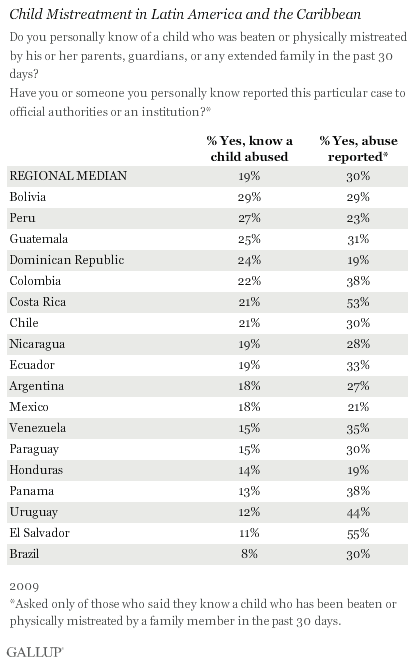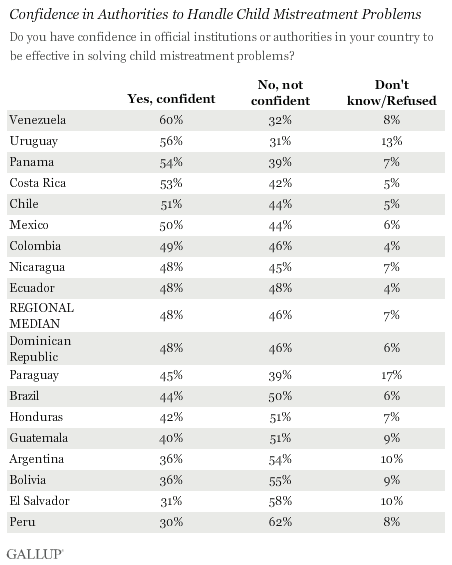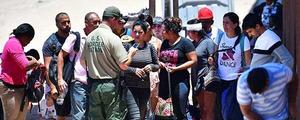WASHINGTON, D.C. -- Forty million children younger than 15 are victims of violence, abuse, and neglect in Latin America and the Caribbean, according to a 2006 UNICEF report. Much of this violence takes place in the home, but Gallup surveys in the region show most adults who know of a child who was beaten or physically mistreated by a family member in the past month say this incident went unreported.

A median of 19% of residents in the 18 Latin American and Caribbean countries surveyed in 2009 say they personally know of a child who was physically abused by a family member in the past 30 days. Among those aware of a specific case of abuse, a median of 30% say it was reported. The number of residents saying they have personal knowledge varies widely across the region, as does the number saying they or someone they know reported the case.
Mistreatment of children is not limited to physical violence. UNICEF estimates more than half of the children in the region are victims of emotional, physical, or sexual abuse. Gallup finds a median of 23% of respondents report knowledge of verbal or emotional abuse toward children by family members, which is slightly higher than the median who report knowing about instances of physical abuse. More than one in three say they know of a child who was verbally or emotionally mistreated by a family member in Bolivia (38%), El Salvador (36%), and Guatemala (35%). Brazilians are the least likely to report knowing about such a child, at 11%.
Improving confidence in official institutions and authorities to handle child mistreatment issues could be key to tackling the problem in this region. Less than half of all respondents -- a median of 48% -- express confidence in the ability of such institutions to handle these issues. Venezuelans are the most likely to express confidence in the authorities to handle such issues, while Peruvians (30%) and Salvadorans (31%) are the least likely.

Bottom Line
Gallup finds a sizable proportion of residents in Latin America and the Caribbean are aware of child abuse, but many are reluctant to report it and lack confidence in authorities to respond to these issues. How these challenges are addressed has major implications on children's welfare in a region that UNICEF reports "has the highest rate of violence affecting women and children" in the world. Public confidence in authorities is vital to tackling these challenges because reaching the Millennium Development Goals is highly dependent on the ability of governments, leaders, and communities to work together to design programs and implement policies that focus on protecting children.
For complete data sets or custom research from the more than 150 countries Gallup continually surveys, please contact SocialandEconomicAnalysis@gallup.com or call 202.715.3030.
Survey Methods
Results are based on face-to-face interviews with approximately 1,000 adults, aged 15 and older, conducted in 2009 in Argentina, Bolivia, Brazil, Chile, Colombia, Costa Rica, Dominican Republic, Ecuador, El Salvador, Guatemala, Honduras, Mexico, Nicaragua, Panama, Paraguay, Peru, Uruguay, and Venezuela. For results based on the total sample of national adults, one can say with 95% confidence that the maximum margin of sampling error ranged from a low of ±3.3 percentage points in Brazil, El Salvador, Guatemala, Honduras, and Nicaragua to a high of ±4.0 percentage points in Venezuela. The margin of error reflects the influence of data weighting. In addition to sampling error, question wording and practical difficulties in conducting surveys can introduce error or bias into the findings of public opinion polls.
